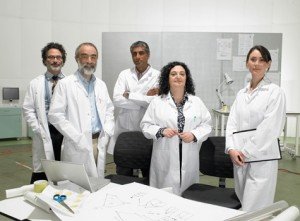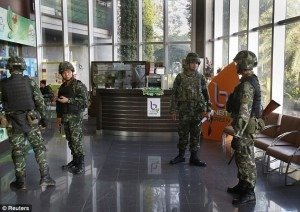BANGKOK — Researchers today announced the discovery of a previously unknown strain of coup d’état, which appears to be indigenous to Thailand.
The so-called subrutum militaris dimidium, or Semi-Coup, was found earlier this week in Bangkok, the capital of the coup-rich ecosystem of Thailand, by social scientists who were researching a separate project on known coup varieties.
“We started seeing all kinds of signs of a coup, including the suspension of media freedoms, the removal of an elected government by extra-legal means, and the violent suppression of pluralist representative government,” explained Dr Felicia Hadermort, the lead scientist on the project. “Yet state life was functioning as normal, with an intact constitution and social services, which traditionally precluded the presence of any known coup species.”

According to Dr Hadermort, the breakthrough arrived when one of the field assistants came upon a newspaper declaring martial law on May 20, including pictures of army tanks in the streets and a general speaking on TV channels.
“The signs were all there. We knew we were in the presence of a coup habitat for sure,” she said. “We just had no idea what kind. It was all very exciting.”
The research team then began gathering all the data they could find on the yet-unnamed coup, and attempting to match them against their database of known coup characteristics and behavior. “We were sure it was probably an existing species of coup,” said Dr Randal Chambers, the team biologist.
“After all, we are in Thailand, where at least 15 species of coup are native.”
Among the many known types of coup to have flourished here since 1932 are subrutu fama institutio (Conventional Coup), subrutum placidas (Silent Coup), subrutum ipsum (Self Coup), subrutum lex legis (Coup By Court Verdict), subrutum per casus (Accidental Coup), subrutum haud causa (Coup Without Reason), and subrutum contra subrutum (Coup Against Previous Coup).
Yet despite exhaustive comparisons, the team were unable to match the new coup to anything that had been recorded in Thailand, or even in other coup environments around the world.
“Many of the coup’s behaviors, including its denials by the military that a coup even existed, seemed to match a Bolivian species, subrutum dimidium tergum, or Half-Assed Coup,” explained Dr Chambers. “We saw several shared characteristics, such as random banning of TV stations. But this subrutum dimidium tergum includes suspension of the constitution, which wasn’t happening here.”
The team eventually realized that this coup was uniquely unable to suspend the constitution because it had been written by the same people now threatening it. According to Hadermort, this distinction was unprecedented in over 300 years of coup taxonomy. “It was as if we’d discovered an animal whose only food source is its own feces,” she said. “It made no sense, and yet there was the evidence right in front of our own eyes. A true half-coup, neither successful or unsuccessful, undeniable yet non-existent. A miracle species, really.”

But the biggest surprise came two days later, when subrutum militaris dimidium suddenly blossomed into a full-blown coup, thus establishing itself as a species with distinct life stages. The team will publish its findings in the journal “Political Nature,” where they outlined the known facts about subrutum militaris dimidium, its habitat, and its place in the Thai political ecosystem.
“As far as we can tell, subrutum militaris dimidium can only exist in very specific environments,” said Dr Randal. “It requires not only the corrupt judicial systems and anti-egalitarian cultural foundations that other coups thrive in, but also a very rare climate of confusion and fatigue with existing political institutions.”
Based on the Bangkok data, Dr Randal hypothesizes that the Semi-Coup is actually a fertile species with a high birth rate, but also a high mortality rate in infancy. “For a Semi-Coup larva to live long enough to pupate into an adult coup, it has to establish itself into an accommodating niche in the social structure. It has to avoid infections from political parties, fight off predators such as internal factionalism, and successfully leech credibility from other institutions like the monarchy or nationalist mythology. And even then, it rarely survives more than six weeks, we think. It either seizes full power or dies.”
Dr Randal was quick to note that despite its mortality rate and low numbers, subrutum militaris dimidium was, like all coups, a remarkable and successful species. In particular, he cited its superior camouflage abilities. “This coup doesn’t just mimic the colors of the national flag, but actually can disguise itself as a civilian police force,” he said. “And it can simultaneously imitate the sounds of nationalist rhetoric while parroting phrases of fake religiosity to confuse its enemies. Absolutely incredible.”

The announcement of the Semi-Coup is already making waves in the field of coup zoology, where it is being hailed as a gateway species to possibly entirely new genera of coups d’état previously inconceivable. “This potentially changes everything we thought we knew about coups,” said Dr Morris Chiu, a research fellow at the School of Coup Studies at the University of Toronto. “In fact, it may represent a mutation within the subrutum family, a genetic adaptation of coups to survive in a new and more hostile world of instant information.”
Randal noted that while many older species of coup had been hampered, or even exterminated, by social media and the global accessibility of information, subrutum militaris dimidium appeared capable of thriving in social media-saturated environments.
“The Semi-Coup’s greatest asset might be its patience, and its ability to time its infestation in media environments. It destroys certain media channels but uses others, new media mostly, to propagate itself.” Hadermort agreed.
“All coups are parasites, opportunistically stealing nourishment from other, more successful and complex forms of human governance,” she noted.
“This kind of coup, one that actually pretends it doesn’t exist, even as it steals both liberty and economic resources, could be the start of a new age of more invisible, more insidious coup infestation.”
“The world needs to keep an eye on Thailand,” she concluded. “There are some very fascinating, but possibly appalling things happening there.”


